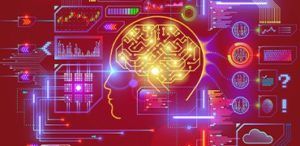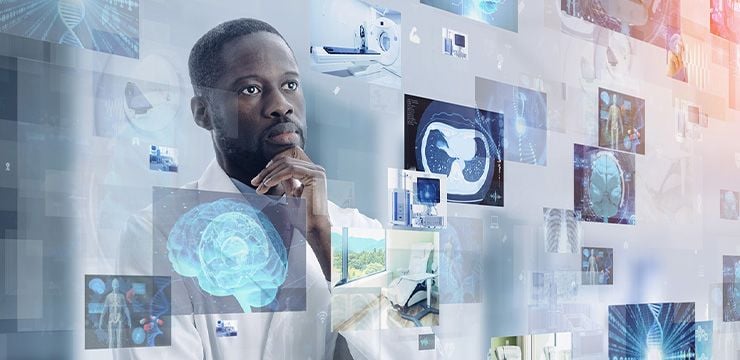How Important is Cognitive Science in Modern Applications?

Artificial Intelligence (AI) has pushed the frontiers of innovation in modern medical science and transformed the way we diagnose, perceive, and treat diseases. But nothing has catalyzed AI’s remarkable evolution more than the developmental studies of the human mind. We have given computers logical and cognitive abilities as a result of studies motivated by structuring the cognitive processes of the brain. This blog explores the shared history of cognitive science, technology, and AI, some key cognitive methods, and what career opportunities await cognitive scientists.
What is Cognitive Science?
Cognitive science is an interdisciplinary study of the human mind and the brain to understand the mental processes behind what scientists call ‘cognition’. Its central tenet describes the human mind primarily as an information processing center. It attempts to understand how the brain processes different knowledge systems and their mental representations to produce intelligent behavior. In short, cognitive science assimilates inputs from philosophy, anthropology, neuroscience, computer science, AI, and linguistics to digitally codify human intelligence.
What are Some Examples of Cognitive Science?
Cognitive psychology, a branch of cognitive science focused on processing behavioral information, leads to a large number of practical examples relevant to our daily lives. Some of the most common instances of cognitive study include:
- Attention Span and Capacity
Cognitive science delves into the neurobiological explanation of human attention span and the psychological capacity to retain information by focusing on anything specific. - Studying the Memory
A major component of cognitive science is the categorization of memories and how our brains synthesize them. - Problem-Solving, Decision-Making, and Achieving Goals
High-level cognitive processes such as decision-making and achieving goals depend on fundamental elements of perception, attention, and memory. Cognitive science delves deep into each of these mental processes to amass intelligent responses to changing environments. - Learning and Language Processing
Cognitive science distinguishes different kinds of learning processes, including language. It involves observing neurological exchanges when the brain acquires, comprehends, and reproduces new methodical information.
ALSO READ: Transforming Healthcare with Data
History of Cognitive Science
The term cognitive science was coined by Christopher Longuet-Higgins in 1973, in his commentary on the Lighthill report but the roots were laid much before. In the mid-1950s, psychologist George Miller led a scientific experiment in psychology in collaboration with scientists and linguists such as Herbert Simon, Allen Newell, and Noam Chomsky. That triggered a more systematic approach to studying mental operations. Their idea was to combine experimental psychology, linguistics, and the computer simulation of cognitive processes into a separate branch of study. Then, in the 1960s, computer scientist and Stanford University professor John McCarthy’s concept of AI filled the technological vacuum in the nascent field by introducing computational models for the mind. And this, in turn, led to the founding of the Cognitive Science Society in 1979. It is a seminal non-profit organization that consolidates scientific research from different fields of study to foster an understanding of the human mind.
Key Cognitive Science Methods
Cognitive science assimilates diverse outlooks of different branches, bringing them under the purview of scientific observation. Its key methods include:
Behavioral Experiments
Cognitive psychological experiments quantify brain activity to comprehend intelligent behavior, recording the real-time responses of participants. The following variables help to understand the behavioral traits and choices of participants:
- The response time of participants sheds light on their innate nature, their cognitive abilities, and how they process different stimuli.
- The psychological responses of participants highlight cognitive bias and sensory activation.
- Visual perception tracking yields crucial insights into decision-making, language processing, and visual perception of individuals.
Brain Imaging
Real-time imaging of neural activity inside the brain has revolutionized studies on cognitive brain function. Here are its primary instruments:
- SPECT (single-photon emission computed tomography) and PET (positron emission tomography) monitor brain activity by injecting radioactive isotopes and tracing them inside the brain.
- EEG (electroencephalography) records neural activity by tracing electric impulses fired by neurons in response to a specific stimulus.
- fMRI (functional magnetic resonance imaging) identifies brain activity by recording the amount of oxygenated blood present in any specific brain region, signifying neural activity.
- MEG (magnetoencephalography) traces magnetic fields around the cortex during any specific test activity.
Computation Modeling
Computational models mimic mental operations and evaluate the behavioral activities of subjects.
- Symbolic modeling maps mental functions to investigate social and organizational cognition, apart from cognitive decision-making.
- Sub-symbolic modeling considers the brain as a collection of multiple nodes and understands brain activity as their synchronized collaboration.
- Hybrid modeling combines the above two processes to shed light on brain activities that activate multiple regions simultaneously.
Top 5 Applications of Cognitive Science
- Education: Creating efficient communication and learning models by studying brain fundamentals on attention, receptivity, and engagement can help to improve educational pedagogy.
- Criminal psychology: Cognitive science unravels sociopathic brain patterns that can predict and prevent crimes by formulating patterns from criminal histories.
- Operations research: Cognitive science informs communication and decision-making strategies to help improve the administrative faculties of large organizations.
- Medicine: Computational models have developed apt medical reasoning and observation of neural activities in neurotypical minds to discover any brain anomalies and enable holistic treatments and diagnosis.
- Human resource management: Cognitive computing has improved abilities in hiring through onboarding, employee engagement, workforce planning, and decision-making.
ALSO READ: Lifelong Learning: What is it and How Do You Benefit From it?
Cognitive Science vs Psychology
Psychology is an umbrella term for understanding the human mind and its thinking patterns without getting into the brain’s deep functionality. Cognitive science, on the other hand, studies the phenomenon of cognition and associated deep neural processes. It stands at an intersection of psychology, neurobiology, social sciences, behavioral science, and biology.
Cognitive Science vs Neuroscience
Cognitive science studies brain processes and tries to structure the abstract phenomenon of human cognition and intelligence. Neuroscience deals with the study of the entire human nervous system and how the underlying neural network functions connect the entire cellular structure via electrical signals.
Career Outlook of Cognitive Science
The interdisciplinary approach of cognitive science enables one to acquire a host of highly transferable hard and soft skills. They attract lucrative offers in different domains such as:
- Psychological and psychiatric therapy
- Healthcare analytics
- Teaching
- Research and development
- UX designing
- Product development
- Linguistic analysis
- Data analysis
- Software engineering
- HR management
ALSO READ: How to Become an HR Manager in 2023: A Comprehensive Guide
Those interested in further research can also engage with the following domains:
- Neurobiology
- Educational neuroscience
- Clinical psychology
- AI and robotics
- Medicine
Frequently Asked Questions
Is Cognitive Science the Same as Psychology?
Both psychology and cognitive science study the mind. However, psychology deals with abstract concepts related to thinking, while cognitive science investigates internal mental processes to map intelligence structures.
What Subject is Cognitive Science?
It is a comprehensive study of mental processes related to thought, learning, memory, attention, and mental organization. It draws its resources from philosophy, anthropology, neuroscience, and psychology.
What is Cognitive Science in Artificial Intelligence?
Cognitive science in artificial intelligence is an interdisciplinary integration of human cognition and technology. It covers reasoning, language, learning, human interactions, and interactions between humans and technology.
The world today is at the intersection of the greatest innovations in the fields of neuroscience, cognitive science, and AI—given their interrelated development. Do look into Emeritus’ thoroughly updated courses on healthcare and make the most of this AI-cognitive science-healthcare trident.
Write to us at content@emeritus.org


















